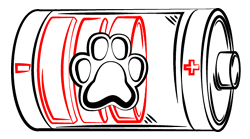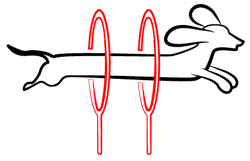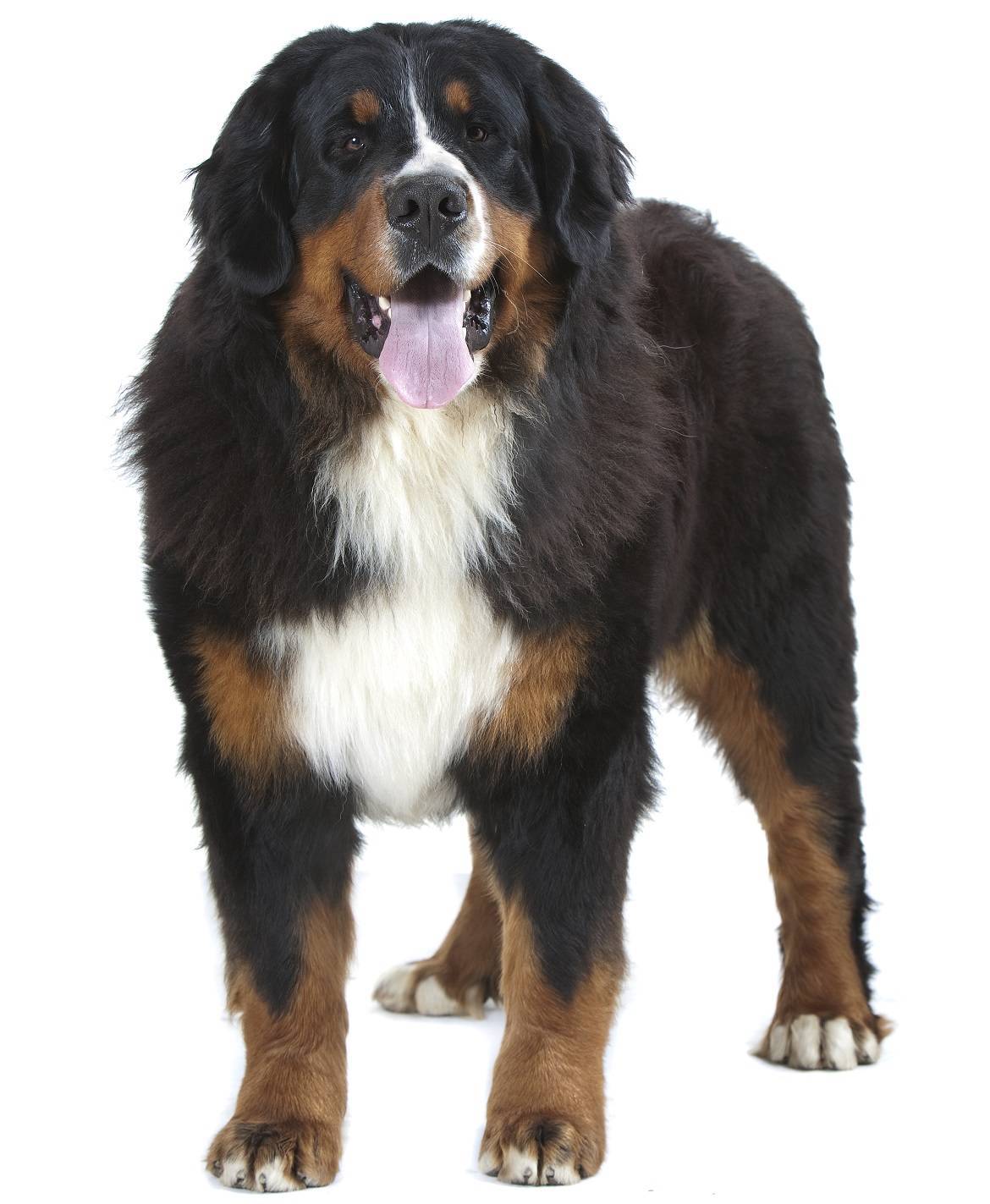
Paws ‘N’ Pups Quickview
Size
| Energy Level
| Trainability
| Paws ‘N’ Pups Rank
|
Characteristics
| Physical Characteristics: Height: 24-29” Weight: 85-140 lbs. Energy Level: Moderate – High | Colors: The American Kennel Club recognizes the Greater Swiss Mountain Dog in the following colors:
|
Health & Longevity
Average Life Span: 10-12 years
The Greater Swiss Mountain Dog is a larger breed of dog, which is relatively healthy. Unfortunately, there have been some reported medical problems that have arisen from poor breeding practices.
It is important that you work with a reputable breeder to ensure the health of your puppy. Some of the medical conditions you need to keep an eye out for include bloat, joint dysplasia, seizures, ectropion, and Panosteitis.
Bloat is a serious and life-threatening condition that can occur when your pup swallows too much air, or too much air has entered into the stomach. This condition causes the stomach to expand and place pressure on other organs nearby, which leads to impaired body functions and ultimately death when not treated.
Joint dysplasia is a painful condition that your Greater Swiss Mountain Dog may experience. This condition can occur in either the elbow or the hip, and each condition is known respectively as elbow dysplasia and hip dysplasia.
If your pup has either of these conditions, you may notice that they move around slowly, are more lethargic, or they experience a lot of pain. This condition can also lead to crippling arthritis.
Seizures are a concern in your pup, so you should monitor your pup closely and report any changes in behavior to your vet. Seizures do not typically develop until anywhere between six months and two years of age. The condition is passed down to your Greater Swiss Mountain Dog and may include the loss of consciousness during an episode.
Ectropion is a condition where your pup’s eyelid is turned outward and may droop or pull away from the eye. This condition may cause your dog’s eyelids to hang lower than they should, exposing more of the eye.
Panosteitis is a painful condition that may affect your Greater Swiss Mountain Dog. This condition causes your pup to lip and have trouble moving around. The condition affects larger breed dogs and occurs when the long bones in the leg begin to develop and grow.
On average, the Greater Swiss Mountain Dog’s life expectancy is 10 to 12 years.
Temperament & Train-ability
The Greater Swiss Mountain Dog is considered a fantastic choice for families, especially since the breed bonds emotionally with his or her family and shows a ton of affection. You will find your pup does well with your children and is very tolerant of kids, even when the kids are young.
This breed is not known for aggression and is very polite and friendly to all he or she encounters. It is important to introduce visitors properly because your Greater Swiss Mountain Dog can serve as a watchdog and alert you to strangers. Using your pup as a watchdog may make him or her warier of visitors, so introductions are best.
The Greater Swiss Mountain Dog loves being around people and suffers from separation anxiety when no one is around. This leads to destructive behavior, especially in puppies who like to chew on everything they can.
Your pup will get along with other pets, but it is important to note that canines of the same sex, when not fixed or altered, may become aggressive towards each other.
Exercise is needed as this breed has a lot of energy, which means he or she is not ideal for apartments and needs a yard to play in. You should make sure you keep your pup inside in the summer months and provide them with water and shade when outside, as they are not very tolerant of hot weather.
Training is considered to be moderately easy, but may come with some difficulty because this breed does have an independent side. This breed may be challenging for new owners. When handled and trained properly, the Greater Swiss Mountain Dog will learn quickly and respond to commands.
Grooming
The Greater Swiss Mountain Dog has moderate grooming needs, especially during shed season. Outside of shed season, this breed is easy to groom and care for.
You should brush your pup a couple of times per week out of shed season. During sheds, you should brush your pup daily to help remove the hair. It is also important to note this breed sheds a lot when shed seasons arrive.
You do not have to bathe your Greater Swiss Mountain Dog on any particular schedule and should only do so when necessary. You should make sure you clean out his or her ears once per week to prevent infection.
Lastly, your Greater Swiss Mountain Dog will need to have his or her nails trimmed once per month to prevent overgrowth of the nails.
Diet
Your Greater Swiss Mountain Dog will consume about 4 to 5 cups of dry food per day. You should feed this breed a high-quality kibble that is rich in protein and made with whole, natural ingredients. You should avoid foods that contain chemicals and by-products, as they do not offer enough nutrition for your pup.
Looking for a Greater Swiss Mountain Dog?
 Find A Greater Swiss Mountain Dog Breeder |  Greater Swiss Mountain Dog Puppies For Sale |  Adopt A Greater Swiss Mountain Dog |
Cost
A Greater Swiss Mountain Dog puppy will cost you approximately $600. It is unlikely that you will find this breed in a local shelter.
In addition to the cost of your puppy, make sure you factor in the annual costs as well. These costs include trips to the vet, preventative medicines, vaccines, and pet supplies.
Paws ‘N’ Pups Ranking
Paws ‘N’ Pups ranks every breed out of 4 with 1 being easiest to integrate into your life and 4 being the toughest – The lower the ranking the better.
Ranking takes into account a few basic factors including cost, skill level needed, high vs low maintenance and how critical regular training is to success. The Greater Swiss Mountain Dog is a good choice for any family, especially since this breed loves children and does well with them. You will find that this choice of pup might not be best for new dog owners. You should have a large, fenced in yard that your pup can play in as the Greater Swiss Mountain Dog does have a lot of energy to burn off. This breed ranks a 2.5.
Breeds Similar To Greater Swiss Mountain Dog
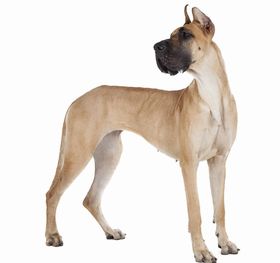 Great Dane | 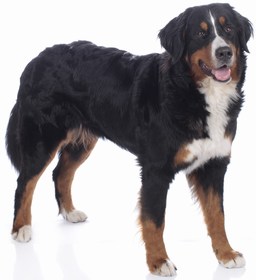 Bernese Mountain Dog | 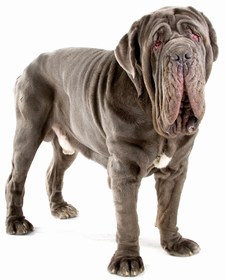 Neapolitan Mastiff | 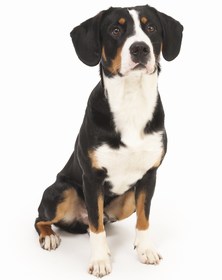 Entlebucher Mountain Dog |


